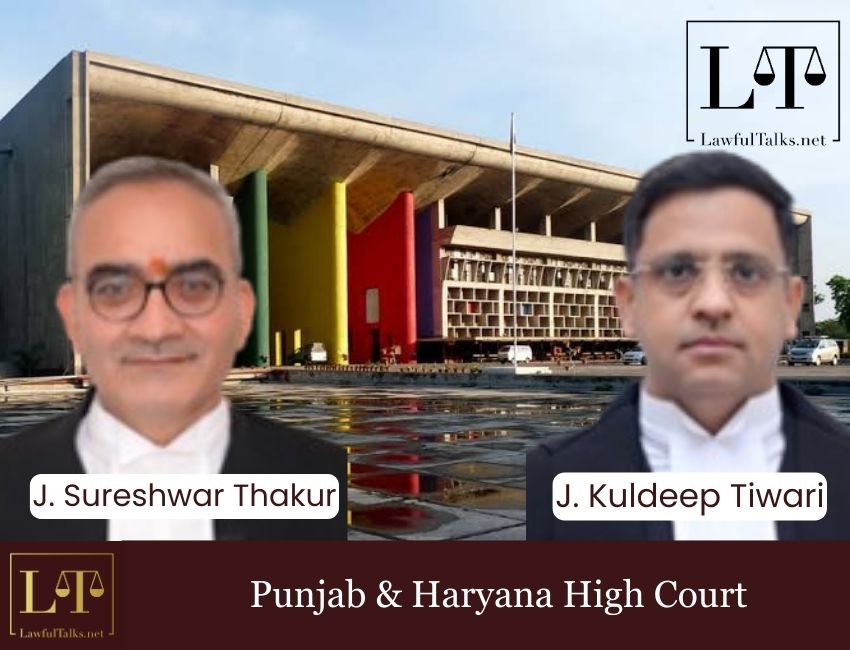Allahabad HC Sets Aside Afzal Ansari's Conviction, Allows Him to Continue as MP

The Punjab and Haryana High Court bench of Justice Sureshwar Thakur and Justice Kuldeep Tiwari quashed a conviction under Sections 363, 366-A, 376, 506 IPC and Sections 4, 6, and 8 of the POCSO Act by the Additional Sessions Judge-cum-Fast Track Court (POCSO). The court noted that the victim's conduct suggested voluntary involvement, as she willingly accompanied the accused and reported no injuries. Additionally, the court highlighted her failure to seek help or raise alarm while being allegedly coerced in public spaces, casting doubt on the prosecution's claims.

This case stems from an FIR registered on 19th January, 2017. The victim, a B.Com. 1st-year student, alleged that the appellant gained her trust by promising marriage and, on 10th January, 2017, took her to his house under false pretenses. There, despite her resistance, he forcibly established physical relations and later threatened her against disclosing the incident. Initially silent due to stress, she eventually informed her parents, who reported the matter to the police. The investigation involved arresting the accused on 20th January, 2017, recording witness statements, preparing site plans, and sending medical evidence for analysis. The victim's detailed statement was recorded under Section 164 Cr.P.C., and the accused was remanded to custody. Upon completing the investigation, a challan under Section 173 Cr.P.C. was filed, and the trial court framed charges under Sections 363, 366-A, 376, 506 IPC and Sections 6 and 8 of the POCSO Act, 2012. The trial involved testimony from 10 prosecution witnesses. Despite the accused's claims of innocence and false implication during proceedings under Section 313 Cr.P.C., the court found him guilty and imposed sentences of imprisonment and fines.
The Advocate for the appellant argued that the conviction verdict of the trial court and the resulting sentence are flawed and warrant interference. He contended that both were based on a gross misappreciation and non-appreciation of evidence relevant to the charges.
The State Advocate argued that the conviction and sentence imposed on the appellant are well-founded and require no interference by the appellate court. He urged the court to dismiss the convict-appellant's appeal.
The court examined whether the prosecutrix was a minor at the time of the alleged offense, rendering her unable to provide valid consent for sexual intercourse. While the prosecution relied on the school admission register, which listed her date of birth as 18th August, 1999, the Principal admitted in cross-examination that the entries were based on an unverified report by a village Chowkidar, who was not called as a witness. This lack of corroboration undermined the presumption of truth under Section 35 of the Indian Evidence Act, leading the court to conclude that the prosecutrix was likely a major at the relevant time, capable of giving consent.
The court also examined whether the sexual act was consensual or coerced. It noted the absence of injuries on the prosecutrix, her lack of resistance while accompanying the accused on his motorcycle, and her admission that no promise of marriage was made, contradicting her earlier claim.
"A reading of the above relevant portion of the cross- examination of the prosecution, but is openly suggestive, that the prosecutrix voluntarily accompanied the accused to the crime site, especially when she has stated that she did not suffer any internal or external injury marks thus on any part of her body rather during the course of her being allegedly subjected to coitus by the accused. Moreover, since she had occupied the pillion of the motorcycle driven at the relevant time by the accused, thereupon when the motorcycle traversed through crowded places, yet even if she was purportedly coerced to occupy the pillion of the motorcycle, rather with the prosecutrix omitting to through raising shrieks and cries, thus invite the attention of the passerby," observed the Court.
After examining the medical report the bench also observed that "the victim was used to sexual intercourse." and that the sample taken from the alleged victim did not match that of the accused.
Consequently, the Punjab and Haryana High Court allowed the appeal and quashed the trial court judgment that had convicted and sentenced the appellant. The appellant was acquitted of all charges, and any fine amount deposited was ordered to be refunded as per the law. The personal and surety bonds of the appellant were cancelled and discharged. The court directed that the case property be dealt with in accordance with law, but after the expiry of the period of limitation for the filing of an appeal. If the appellant was in custody and not required in any other case, the court ordered his immediate release, with release warrants prepared accordingly.
Advocate for the Petitioner: Rajiv Joshi, Advocate and Viren Sibal, Advocate (Legal Aid Counsel); Harshit Singla, Advocate and Nikhil Chopra, Advocate.
Advocate for the Respondent: Maninder Singh, Senior DAG, Punjab.
Case Details: X v. State of Punjab, CRA-D-726 of 2022.

Anushka Bandekar
Advocate
Latest Posts
Categories
- International News 19 Posts
- Supreme Court 390 Posts
- High Courts 383 Posts



















































































































































































































































































































































































































































































































































































































































































































































































































